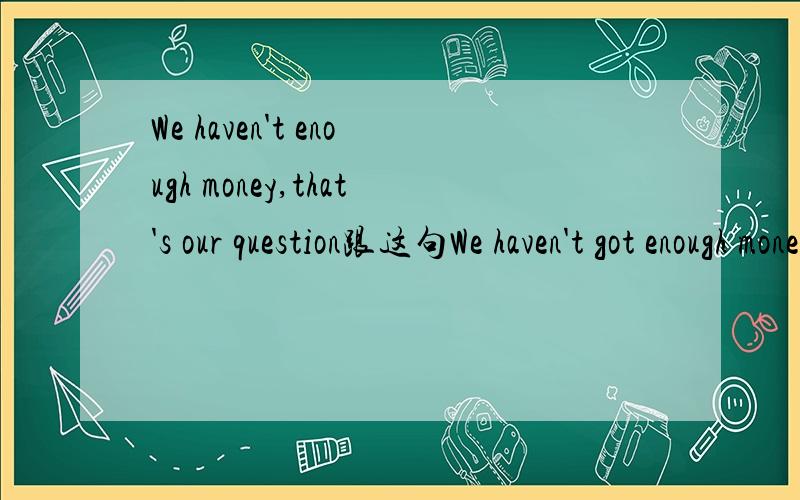We haven't enough money,that's our question跟这句We haven't got enough money,that's our question 有分别吗
来源:学生作业帮助网 编辑:作业帮 时间:2024/04/30 06:22:02

We haven't enough money,that's our question跟这句We haven't got enough money,that's our question 有分别吗
We haven't enough money,that's our question
跟这句We haven't got enough money,that's our question 有分别吗
We haven't enough money,that's our question跟这句We haven't got enough money,that's our question 有分别吗
从说话者所要表达的含义上来讲,两句并没有任何区别.翻译过来,意思也是一样的:“我们的钱不够了,真麻烦!”如果说有区别的话,也不是一点区别也没有.
从语法上讲,前一句使用了现在完成时态,后一句则是一般现在时.从语言习惯上讲,英国英语使用者倾向于使用前者,这种表达方式比较正式,后者则更受美国英语的青睐,在表意一致的前提下更加简洁.
个人意见,仅供参考.
当然有。
前者是说我们没有足够的钱。
后者是说我们没拿到或没找到或没筹集到足够的钱的意思。
当然也有楼上所说的区别。
意思基本没有分别。
在英语口语中,常用have got和have got to分别代替 have 和 have to。
但在下列六种情况下,只能用have,不能用have got:
1. 在助动词、情态动词之后。
如:
He may have got a new story-book. (×)
He may have...
全部展开
意思基本没有分别。
在英语口语中,常用have got和have got to分别代替 have 和 have to。
但在下列六种情况下,只能用have,不能用have got:
1. 在助动词、情态动词之后。
如:
He may have got a new story-book. (×)
He may have a new story-book. (√)
2. 在动词不定式之后。
如:We would like to have got a dog. (×)
We would like to have a dog. (√)
3. 在过去时或完成时中。
如:Lucy had got a new dress yesterday. (×)
Lucy had a new dress yesterday. (√)
4. 用作使役动词,作“使、让”讲时。
如:We have got her wait there by herself. (×)
We have her wait there by herself. (√)
5. 当have与动词转化来的名词构成短语时。
如:have a look;have a rest;have a drink;have a walk等。
6. 在一些固定习语中。
如:have a good time; have break fast; have lessons; have sports等。
收起
一个是英语,一个是美语,老美爱在have 或has
后加got.
两句意思一样,但后者较好。